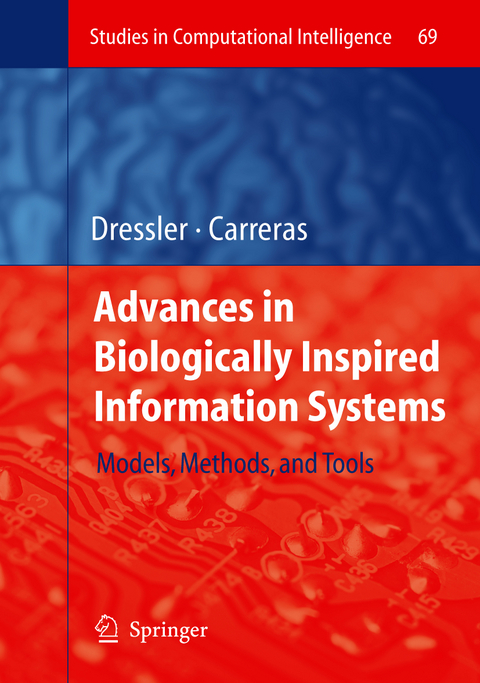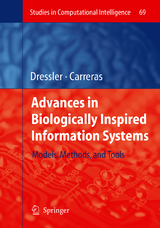Advances in Biologically Inspired Information Systems
Springer Berlin (Verlag)
978-3-540-72692-0 (ISBN)
Technology is taking us to a world where myriads of heavily networked devices interact with the physical world in multiple ways and at multiple scales, from the global Internet down to micro and nano devices. Many of these devices are highly mobile and must adapt to the surrounding environment in a totally unsupervised way.
A fundamental research challenge is the design of robust decentralized computing systems that are capable of operating under changing environments and noisy input, and yet exhibit the desired behavior and response time, under constraints such as energy consumption, size, and processing power.
Biological systems are able to handle many of these challenges with an elegance and efficiency still far beyond current human artifacts. The goal is to obtain methods on how to engineer technical systems, which have similar high stability and efficiency.
With this book, we present a comprehensive overview of the most promising research directions in the area of bio-inspired computing. According to the broad spectrum addressed by the different book chapters, a rich variety of biological principles and their application to ICT systems are presented.
Self-Organizing Network Environments.- Bio-inspired Framework for Autonomic Communication Systems.- Towards a Biologically-inspired Architecture for Self-Regulatory and Evolvable Network Applications.- Biologically Inspired Synchronization for Wireless Networks.- Bio-Inspired Congestion Control: Conceptual Framework, Algorithm and Discussion.- Self-Organized Network Security Facilities based on Bio-inspired Promoters and Inhibitors.- System Design and Programming.- Context Data Dissemination in the Bio-inspired Service Life Cycle.- Eigenvector Centrality in Highly Partitioned Mobile Networks: Principles and Applications.- Toward Organization-Oriented Chemical Programming: A Case Study with the Maximal Independent Set Problem.- Evolving Artificial Cell Signaling Networks: Perspectives and Methods.- Sensor and Actor Networks.- Immune System-based Energy Efficient and Reliable Communication in Wireless Sensor Networks.- A Bio-Inspired Architecture for Division of Labour in SANETs.- A Pragmatic Model of Attention and Anticipation for Active Sensor Systems.- Search and Optimization.- Self-Organization for Search in Peer-to-Peer Networks.- A Bio-Inspired Location Search Algorithm for Peer to Peer Networks.- Ant Colony Optimization and its Application to Regular and Dynamic MAX-SAT Problems.
| Erscheint lt. Verlag | 9.7.2007 |
|---|---|
| Reihe/Serie | Studies in Computational Intelligence |
| Zusatzinfo | XII, 302 p. |
| Verlagsort | Berlin |
| Sprache | englisch |
| Maße | 155 x 235 mm |
| Gewicht | 626 g |
| Themenwelt | Informatik ► Theorie / Studium ► Künstliche Intelligenz / Robotik |
| Informatik ► Weitere Themen ► Bioinformatik | |
| Mathematik / Informatik ► Mathematik ► Angewandte Mathematik | |
| Technik | |
| Schlagworte | algorithm • algorithms • Architecture • autonom • Bioinformatik • Biologically Inspired Information Systems • Communication • Computational Intelligence • Environment • Informationssystem • information system • Model • Optimization • programming • Sensor • Service • stability |
| ISBN-10 | 3-540-72692-6 / 3540726926 |
| ISBN-13 | 978-3-540-72692-0 / 9783540726920 |
| Zustand | Neuware |
| Haben Sie eine Frage zum Produkt? |
aus dem Bereich




